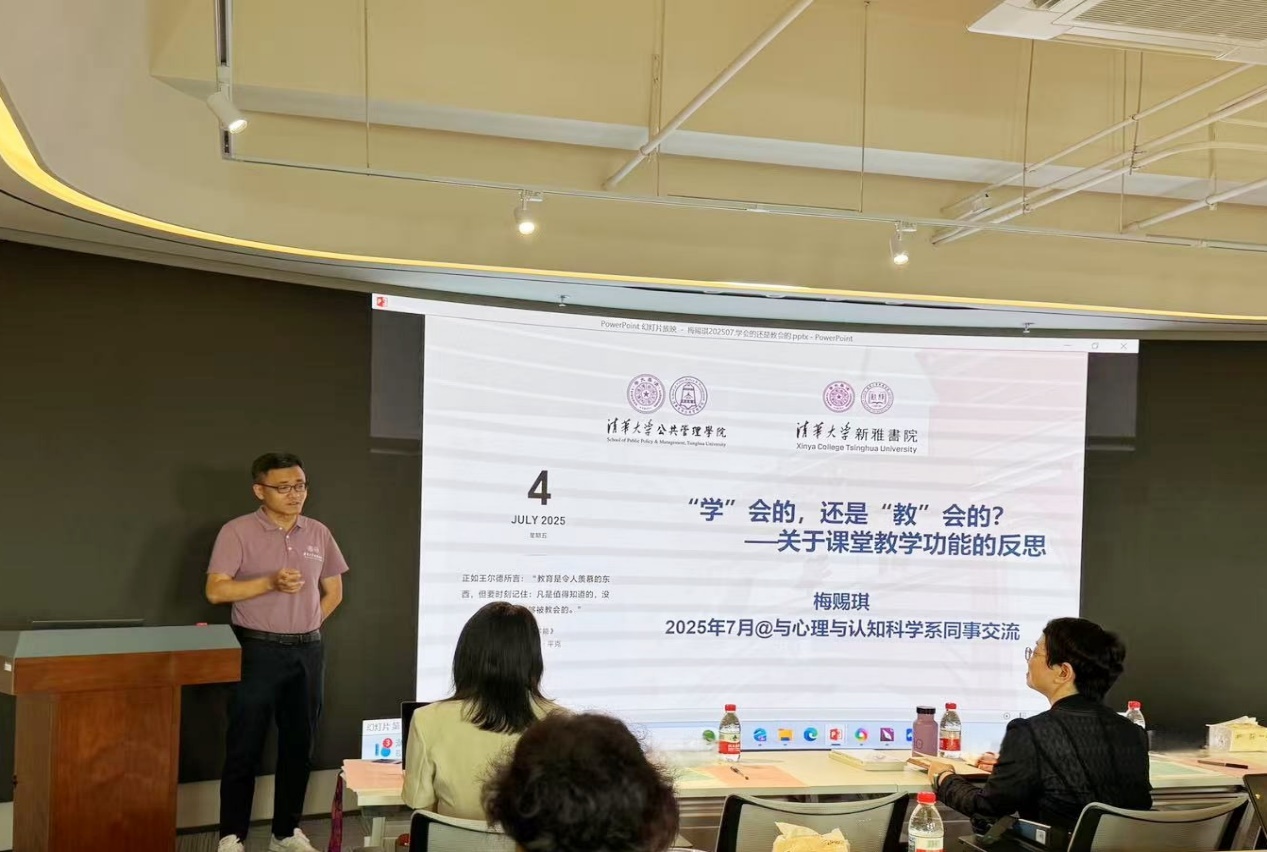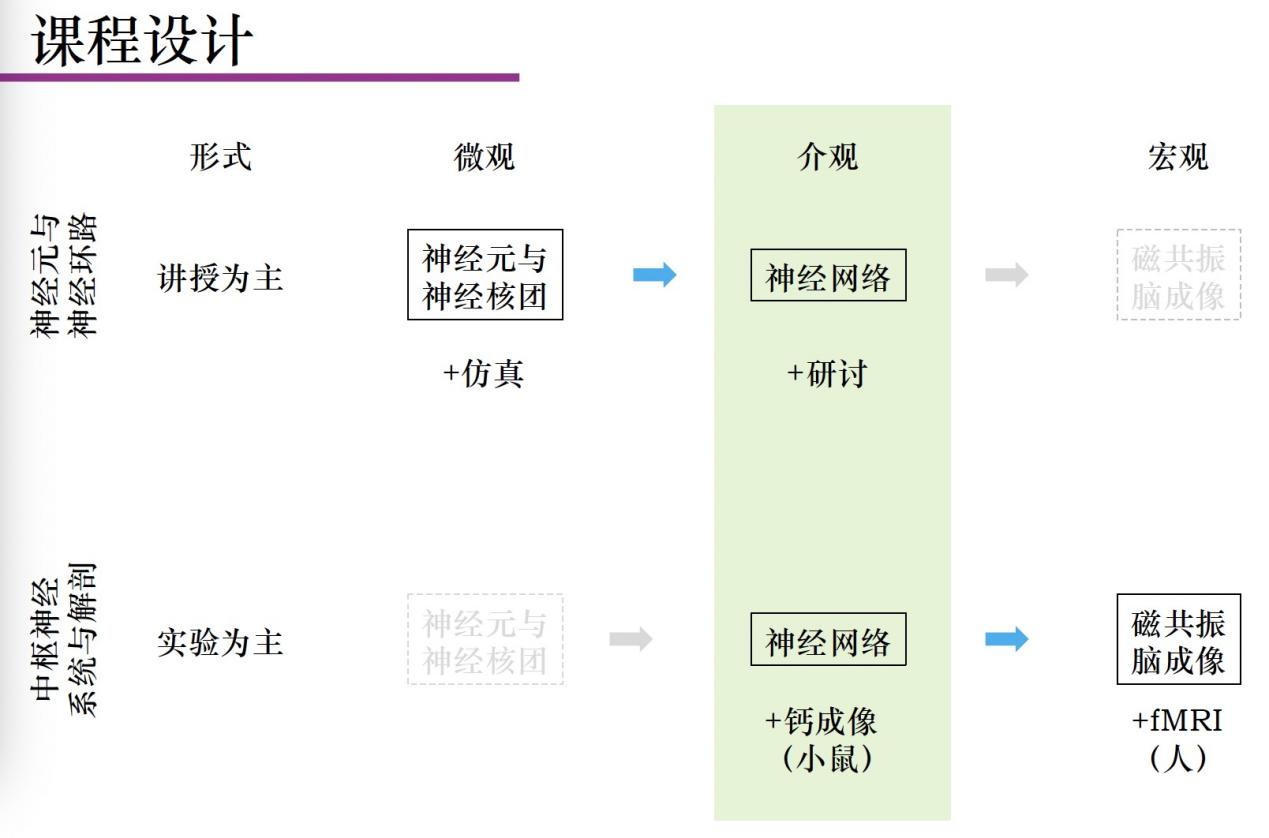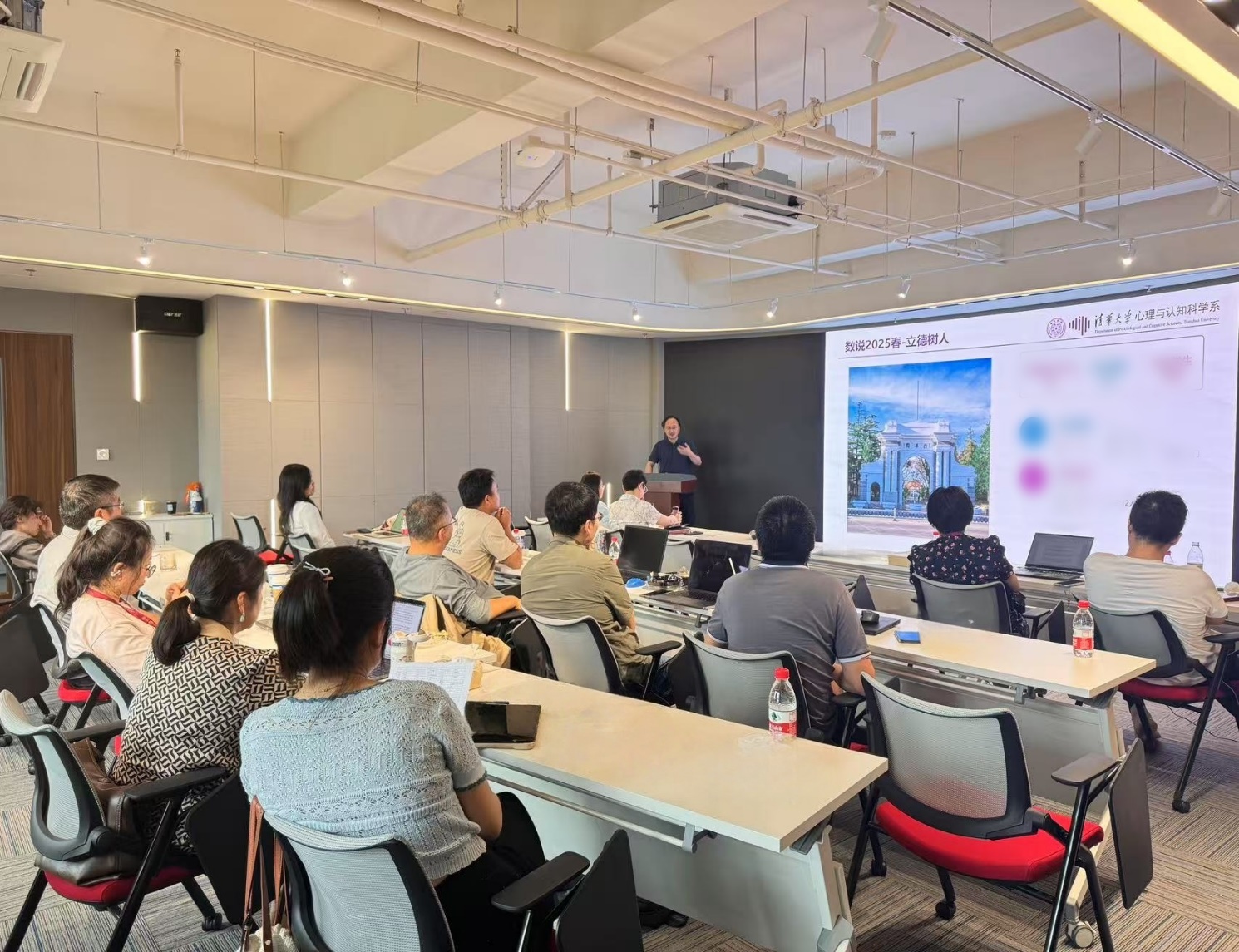Recently, the Department Psychological and Cognitive Sciences at Tsinghua University held a two-day 2025 spring semester teaching workshop at Lv Dalong Building. The meeting featured in-depth discussions on four major themes: spring semester course reviews, fall semester new course design, graduate curriculum development, and AI-empowered teaching innovation. The meeting was presided over by Zhen Wu, Associate Director of the Psychological and Congnitive Sciences, with all faculty and staff gathering together to build consensus and jointly plan new chapters in education.
This workshop focused on reflection and optimization of talent cultivation goals, reaffirmed the teaching philosophy that emphasizes both theoretical learning and hands-on practice, and is committed to cultivating students to master core knowledge and methodological technologies in psychology, brain science, and artificial intelligence, with a focus on enhancing five key abilities: research ability (discovering and proposing correct questions), statistical ability (exploring relationships among all things), logical ability (deducing the unknown from the known), psychological ability (understanding oneself, perceiving others), and rhetorical ability (persuading others, leading innovation).
Around this goal, the Department Psychological and Congnitive Sciences continues to advance a reform model centered on "phenomenon-based teaching + project-based teaching": guiding interdisciplinary critical thinking through observation and analysis of real phenomena, combined with practice-oriented experimental projects, cultivating students’ critical thinking and innovative problem-solving abilities, and strengthening their foundation for future careers in areas such as scientific research, intelligent technology development, and mental health services.
Focusing on frontier courses, deepening interdisciplinary integration
This workshop systematically reviewed the teaching reform experiences of newly offered courses in the spring 2025 semester, including "Evolution and Development of Mind," "Advanced Mind," "Neurons and Neural Circuits," and "Central Nervous System and Anatomy," and conducted collective discussions on upcoming new courses such as "Cognitive Mechanisms and Behavior of the Brain" and "Brain-Inspired Artificial Intelligence." The Department Psychological and Congnitive Sciences has conducted department-wide teaching workshops every semester for 4 consecutive years, using collective lesson preparation, case studies, and student feedback as focal points to promote continuous optimization and iteration of courses.
Ying Li, Party Secretary of the Department Psychological and Congnitive Sciences, highly praised the exploration and dedication of the teaching team in teaching reform in her opening remarks and expressed high expectations for future development.

Ciqi Mei speaking
Ciqi Mei, Dean of Xinya College, was invited to share his teaching experience. With the title ""Learned" or "Taught"? ¡ª Reflections on the Functions of Classroom Teaching," he used 3 theoretical frameworks and 12 classroom examples to guide all department teachers to reexamine "what exactly happens in teaching." Using cases such as Xinya's "Academic Romance" series and small class teaching reform, he called for moving from "teaching" to "learning," transforming classrooms into "pathfinding" rather than "illumination," guiding students into learning situations, stimulating their confidence in continuous learning, and thus ‘enabling students to learn things that the teachers themselves do not yet know."
Core courses showcase highlights, initial teaching effectiveness emerges
"Evolution and Development of Mind" is jointly offered by Department Psychological and Congnitive Sciences teachers Zhen Wu and Yisi Zhang, exploring the interactive effects from microscopic genes to macroscopic sociocultural factors around the origin and development of mind. Starting from themes such as perception-movement, learning and reasoning, emotion and affect, language and thinking, it adopts phenomenon-based teaching combined with diverse project-based tasks including academic presentations, academic debates, BBS comments, multi-perspective discussions, and internship practice, strengthening students’ critical thinking, teamwork, and communication skills. Teaching research data shows that this course has significant effects in stimulating learning interest and curiosity, and enhancing critical thinking and research interest.
"Advanced Mind" focuses on society and health, deeply combining phenomenon-based teaching with project-based teaching through the three-dimensional cross perspective of abnormal psychology-healthy psychology-social psychology. Starting from real clinical cases and actual phenomena in the mental health field, using cutting-edge academic debates as entry points (such as the advantages and disadvantages of classification and diagnostic systems for psychological disorders), through three-stage training of literature intensive reading, academic debates, and critical writing, it guides students to deeply think about frontier debates and academic issues in the psychology field while consolidating foundations, systematically enhancing students' critical thinking and innovative thinking abilities. The Field Study module in the course demonstrates the application of interdisciplinary fields of mental health and artificial intelligence in real-world contexts, with practical activities receiving unanimous praise from students.
The "Scientific Research Career Management" course is offered by Department Psychological and Congnitive Sciences teacher Jingyuan Liu. The course goal is to provide a foundation for scientific research practice, with "how research novices grow step by step into research experts" as the main thread, sequentially setting up 8 thematic units: overview of the research process, career planning, ethical practice, academic standards, paper writing, academic presentations, and bottleneck response, helping students take the ‘first step in research’ and build confidence and pathways for career development.
Department Director Jia Liu systematically shared the teaching exploration and practice of two fundamental brain science courses, "Neurons and Neural Circuits" and "Central Nervous System and Anatomy," with "understand the brain, manipulate the brain, and simulate the brain" as the core teaching goal. "Neurons and Neural Circuits" takes "phenomenon-based learning" teaching as the core model, focusing on the "ion channel model ¡ú calcium imaging ¡ú neural nuclei" chain at the microscopic-mesoscopic level, emphasizing interdisciplinary thinking cultivation. The course is also supplemented with AI tools to support learning summaries. "Central Nervous System and Anatomy" takes "project-based teaching" as the core model, connecting the "mouse craniotomy - calcium imaging - human brain fMRI" technical pathway at the mesoscopic-macroscopic level, highlighting practical training, and gradually building students’ experimental thinking and systematic disciplinary knowledge framework.

"Neurons and Neural Circuits" and "Central Nervous System and Anatomy" course design
2025 fall semester new course preview: deep integration of psychology, brain, and artificial intelligence
In the fall 2025 semester, the Department Psychological and Congnitive Sciences will launch multiple cutting-edge new courses: "Cognitive Mechanisms and Behavior of the Brain" taught by Department Psychological and Congnitive Sciences teacher Chaogan Yan takes TMS-fMRI combined use as the core technology, and students will undergo full-process training in ‘cognitive concept → experimental design → individualized brain regulation → behavior-brain activity analysis → paper writing." The course emphasizes individualized target calculation and neural circuit analysis, directly serving precision intervention research for diseases such as depression. The course uses "project-based teaching" throughout the course design, supporting students to combine theory with practice, cultivating problem-solving abilities and systematic scientific research thinking.
"Brain-Inspired Artificial Intelligence" co-taught by Department Psychological and Congnitive Sciences teachers Yuanyuan Mi and Liyuan Wang will systematically organize the theory-practice pathway of biological neural circuits and brain-like computing. The course adopts project-based teaching, covering multiple brain-like algorithm modules inspired by neural information processing mechanisms of synaptic plasticity, neurons, and neural networks, and requires students to complete reproducible NeuroAI research projects and deliver academic presentations.
AI-empowered teaching: from teaching assistant to "intelligent classroom"
Department Psychological and Congnitive Sciences teacher Jing Qian, using ‘Mind, Individual, and Culture’ as an example, demonstrated longitudinal research on AI teaching assistant development, from application to empirical evidence. Through the development of two models over three semesters, it effectively improved students' critical thinking abilities and received unanimous praise from students. In the single-blind test of GLMalpha, students rated the AI teaching assistant’s feedback as superior to that of human teaching assistants, while GLMC⟡ inspired students’ creativity and critical thinking more effectively than GLMalpha. Overall, AI teaching assistants can effectively improve teaching efficiency and student experience.
School of Education teacher Jifan Yu shared the functions and construction progress of the MAIC (Massive AI-empowered Courses) platform. MAIC is a classroom managed and operated by AI, integrating large models and multi-agent systems, supporting full-process lesson preparation, intelligent Q&A, learning situation feedback, emotional companionship, and more.
In addition, Associate Director Dan Zhang of the Department Psychological and Congnitive Sciences shared that graduate courses will start from a three-tier architecture of "general foundation ¡ú professional advancement ¡ú intelligent enhancement" to build a systematic talent cultivation framework that combines general education with intelligent enhancement.
Looking to the future: cross-integration, upholding integrity and innovation
At the end of the teaching workshop, Ying Li systematically reviewed in her summary the department's phased achievements in deeply studying and implementing the spirit of the Central Committee's Eight-Point Regulation learning and education, deepening work style construction, and serving the school's mental health work, and made reminders about requirements for summer theoretical learning and teacher ethics.

Jia Liu's summary
Jia Liu pointed out that in the future, the Department Psychological and Congnitive Sciences will accelerate high-level talent introduction and cultivation, strengthen interdisciplinary integration, and create internationally competitive psychology discipline highlands, contributing ‘heart power’ to the school’s advancement toward world-class university status.

